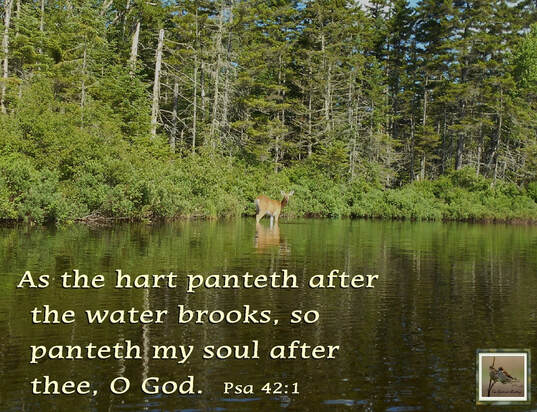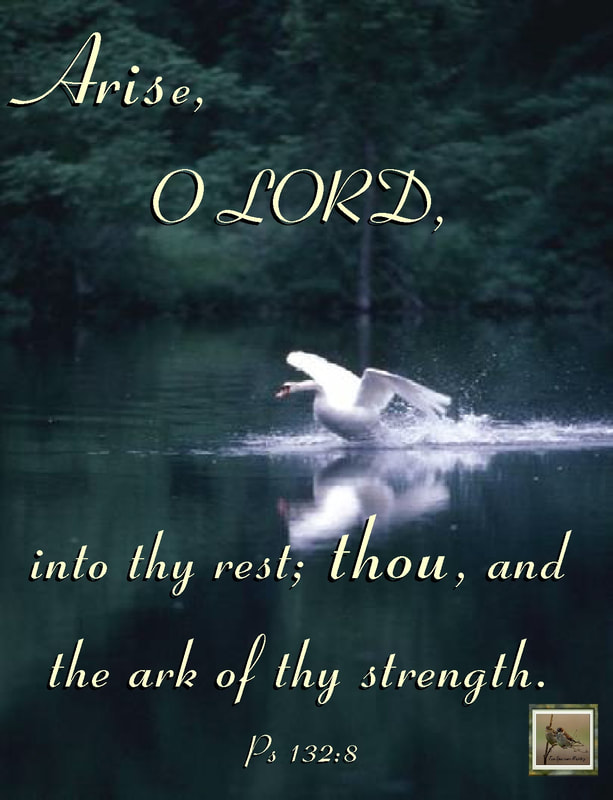To the chief Musician upon Nehiloth, A Psalm of David. Give ear to my words, O LORD, consider my meditation. Hearken unto the voice of my cry, my King, and my God: for unto thee will I pray. My voice shalt thou hear in the morning, O LORD; in the morning will I direct my prayer unto thee, and will look up. For thou art not a God that hath pleasure in wickedness: neither shall evil dwell with thee. Psa 5:1-4
PROTECTION FROM THE WICKED
PROTECTION FROM THE WICKED
The ordering of prayer is very necessary, Gen_22:9. Our Lord’s prayer should be our model. Often our words need to be supplemented by our meditations; that is, we must make room for the “groanings which cannot be uttered,” but which the Spirit understands, Rom_8:26-27. Distinct from either of these is the urgent ejaculation for aid which is here described as the voice of my cry, Psa_5:2. As soon as we awake, let us speak to God. We must keep watch for the answer, Psa_5:3, R.V. How many answers we miss, because we get tired of waiting for the return of our ships!
Note the seven expressions for the ungodly, Psa_5:4-7. As for me-the chief of sinners, but see 1Co_15:10. The Jew in prayer turned toward the Temple, Psa_5:7; Dan_6:10. Here the Tabernacle, which preceded it, stood for the same, 1Sa_1:9. We look to the Most Holy Place, whither Jesus has entered, Heb_10:19.
The ungodly are specially characterized by sins of speech, Psa_5:9. Wicked men are like sepulchers, which exhale pestilential odors. Their doom is inevitable. Notice the combination of trust, love, and joy, Psa_5:11.
F.B. Meyer
Note: In this short devotion Mr. Meyer gives many scriptural references-it is an excellent study that could take weeks to go deep into it's nourishment. I'm leaving it up to the reader, how much it's worth to them, to do the work and study. Our spirits grow according to how much we really desire truth.
Note the seven expressions for the ungodly, Psa_5:4-7. As for me-the chief of sinners, but see 1Co_15:10. The Jew in prayer turned toward the Temple, Psa_5:7; Dan_6:10. Here the Tabernacle, which preceded it, stood for the same, 1Sa_1:9. We look to the Most Holy Place, whither Jesus has entered, Heb_10:19.
The ungodly are specially characterized by sins of speech, Psa_5:9. Wicked men are like sepulchers, which exhale pestilential odors. Their doom is inevitable. Notice the combination of trust, love, and joy, Psa_5:11.
F.B. Meyer
Note: In this short devotion Mr. Meyer gives many scriptural references-it is an excellent study that could take weeks to go deep into it's nourishment. I'm leaving it up to the reader, how much it's worth to them, to do the work and study. Our spirits grow according to how much we really desire truth.
MORNING PRAYER FOR GOD'S INTERVENTION
“A morning prayer of David, appealing to God as his king, against whose sovereignty his own enemies were really in rebellion.”—Kay. “This psalm must have been composed at Jerusalem, since David had access to the house of God (see Psa_5:7); probably a short time before the open revolt of Absalom, when the king was aware of the machinations of conspirators under a bloodthirsty and treacherous chief (Psa_5:6). Like Psalms 3, it is a morning song (Psa_5:6).”—Speaker’s Commentary.
I. True prayer is personal
“My words,” “My meditation,” “My cry,” “My King,” “My God.” David was a king, yet was he his own chaplain. We must pray for ourselves. A parent’s prayer, a minister’s prayer, will not do for us. No one can become deputy for us before the throne of grace. And in prayer we must realise our personal relation to God. He is “My Father,” “My King,” “My God.”
II. True prayer is profound and passionate.
1. It begins with words. “Give ear to my words.” Many have an idea that words are not necessary to prayer, that the finest prayer does without words. When Curran asked Grattan if he ever prayed; “No,” said Grattan, “but I have aspirations all the day long.” There is a subtle danger here. True prayer cannot indeed fully express itself, but it will labour to do so. If our sense of need is real and intense, we shall speak out in broken, burning words. Robert Hall, in his private devotions prayed aloud, lest his prayers should become vapid and wandering. If there is no audible, verbal prayer, the “aspirations” will become ever more shadowy and vague. “None of God’s children are possessed with a dumb devil.”—Spurgeon.
2. True prayer deepens into sighs. “O Lord, consider my sighs.” “Understand my sighing.”—Horsley. “Meditation—moanings of that half-uttered form to which deep feeling gives rise—groanings,” as Rom_8:26-27.—Jamieson. If language could express all we feel, ours could hardly be a true prayer; language breaks off into groanings.
3. True prayer rises into cries. “Hearken unto the voice of my cry.” It rises into a cry, and a cry has a voice which pierces heaven. Prevailing prayer comes from the profound of the bosom and is heard in the high places of the firmament.
III. True prayer is resolute.
“For unto Thee will I pray.” “There is a holy boldness here. God, as the King of His people, could not deny them His protection, and they asked no other. For to Thee, and Thee only, will I pray. As if he had said, it is in this capacity that I invoke Thee, and I therefore must be heard.”—Alexander.
IV. True prayer is obedient.
Psa_5:3. “In the morning will I set in order for Thee, and will look out.”—Kay. David speaks of himself, figuratively, as a ministering priest, setting in order the altar wood and the morning sacrifice. Now the Levite acted according to the law of God in presenting the sacrifices, and they were accepted only as they were so offered. In prayer we must recognize the word and will of God. Prayer is not, as some suppose, a wild, arbitrary, lawless overriding of Divine law; but, on the contrary, it profoundly consults the mind of God; it regulates its petitions by the revealed will of God, and seeks to conform all life to the purpose and plan of God.
V. True prayer is expectant.
“And will look up,” or look out. “Look out expectantly for the thing prayed for.”—Kay. Alexander says: “The image presented is that of one looking from a wall or tower in anxious expectation of approaching succour.” Horsley says: “I will watch for Thee—i.e., watch for some usual signal of God’s favour, some appearance in the flame of the sacrifice, or a ray of the Shekinah issuing from the sanctuary.” Let us look for answers to our prayers. When a man has lodged his prayers with God he may look up, he ought to look up, and God will not disappoint him.
Let us then each morning thus draw nigh unto God. We cannot tell what a day shall bring forth, but if we greet the morning sun with prayer, we shall see the setting sun with praise.
I. True prayer is personal
“My words,” “My meditation,” “My cry,” “My King,” “My God.” David was a king, yet was he his own chaplain. We must pray for ourselves. A parent’s prayer, a minister’s prayer, will not do for us. No one can become deputy for us before the throne of grace. And in prayer we must realise our personal relation to God. He is “My Father,” “My King,” “My God.”
II. True prayer is profound and passionate.
1. It begins with words. “Give ear to my words.” Many have an idea that words are not necessary to prayer, that the finest prayer does without words. When Curran asked Grattan if he ever prayed; “No,” said Grattan, “but I have aspirations all the day long.” There is a subtle danger here. True prayer cannot indeed fully express itself, but it will labour to do so. If our sense of need is real and intense, we shall speak out in broken, burning words. Robert Hall, in his private devotions prayed aloud, lest his prayers should become vapid and wandering. If there is no audible, verbal prayer, the “aspirations” will become ever more shadowy and vague. “None of God’s children are possessed with a dumb devil.”—Spurgeon.
2. True prayer deepens into sighs. “O Lord, consider my sighs.” “Understand my sighing.”—Horsley. “Meditation—moanings of that half-uttered form to which deep feeling gives rise—groanings,” as Rom_8:26-27.—Jamieson. If language could express all we feel, ours could hardly be a true prayer; language breaks off into groanings.
3. True prayer rises into cries. “Hearken unto the voice of my cry.” It rises into a cry, and a cry has a voice which pierces heaven. Prevailing prayer comes from the profound of the bosom and is heard in the high places of the firmament.
III. True prayer is resolute.
“For unto Thee will I pray.” “There is a holy boldness here. God, as the King of His people, could not deny them His protection, and they asked no other. For to Thee, and Thee only, will I pray. As if he had said, it is in this capacity that I invoke Thee, and I therefore must be heard.”—Alexander.
IV. True prayer is obedient.
Psa_5:3. “In the morning will I set in order for Thee, and will look out.”—Kay. David speaks of himself, figuratively, as a ministering priest, setting in order the altar wood and the morning sacrifice. Now the Levite acted according to the law of God in presenting the sacrifices, and they were accepted only as they were so offered. In prayer we must recognize the word and will of God. Prayer is not, as some suppose, a wild, arbitrary, lawless overriding of Divine law; but, on the contrary, it profoundly consults the mind of God; it regulates its petitions by the revealed will of God, and seeks to conform all life to the purpose and plan of God.
V. True prayer is expectant.
“And will look up,” or look out. “Look out expectantly for the thing prayed for.”—Kay. Alexander says: “The image presented is that of one looking from a wall or tower in anxious expectation of approaching succour.” Horsley says: “I will watch for Thee—i.e., watch for some usual signal of God’s favour, some appearance in the flame of the sacrifice, or a ray of the Shekinah issuing from the sanctuary.” Let us look for answers to our prayers. When a man has lodged his prayers with God he may look up, he ought to look up, and God will not disappoint him.
Let us then each morning thus draw nigh unto God. We cannot tell what a day shall bring forth, but if we greet the morning sun with prayer, we shall see the setting sun with praise.
THE RELATION OF GOD TO THE WICKED
I. God has no pleasure in wickedness.
Psa_5:4. The Psalmist seems to say, There are such gods in other nations, gods delighting in blood and lust; but Thou dost not delight in iniquity. The gods of Greece and Rome found pleasure in licentiousness; but, however Christianity may be a ‘civilised heathenism,’ it sets before us Deity in another light than that.
II. God does not tolerate wickedness.
“Neither shall evil dwell with Thee.” Many would teach us that God does tolerate evil—that He employs it to perfect man, to develop the universe. No; He cannot dwell with it, cannot tolerate it. Remember this in the Church. History relates that Redwald, King of East Anglia, built a church, at one end of which was an altar for the sacrifice of the mass, and at the other end an altar for sacrifice to the old British idols. How frequently the Church is in danger of making analogous compromises, allowing certain evils to exist within its borders for the sake of gold, or popularity, or peace. It must not be, or God will not dwell with us. And we must remember this in our personal life. “Rest assured, Christ will not live in the parlour of our hearts if we entertain the devil in the cellar of our thoughts.”—Spurgeon. God does not tolerate wickedness. It is no part of His pleasure, no part of His policy, that evil should be found in the human heart or in the world.
III. God hates wickedness.
“Thou hatest all the workers of iniquity” (Psa_5:5-6). “The Lord abhors the wicked.” He “will destroy them.” It is unspeakably repugnant to Him. “God perfectly hateth wickedness and wicked persons. God hateth sin worse than He doth the devil; for He hateth the devil for sin’s sake, and not sin for the devil’s sake.”—Trapp.
We see here the condemnation of whatever speaks lightly or tolerantly of sin. Of the philosophy which does—the philosophy which pleads for evil as necessary to effect God’s purposes; as one of our poets speaks of the devil--
“Existing for some good,
By us not understood.”
Of the morality which does—the morality which regards sin as an inconvenience or impolicy, rather than as damnable in its essence. Of the Christianity which does—Antinomianism; Roman Catholicism, with its division of sin into venial and mortal; and that general Christian experience which has no burning hatred to evil.
In our personal life, in the Church, in all departments of worldly action, we must look upon foulness with horror, or with horror God will look upon us “Ye that love the Lord hate evil.”
These lessons that are put here, as I said, have enough meat in them to help anyone spend many hours-into weeks to really get the deep truths that are in them; but, it's up to you, how much you really desire to know God, and His ways. I hope these will spark a fire that will grow in you, and cause you to hunger and thirst for righteousness, and all God has for you.
Lorna Couillard
Note: At the right column under resources, there are links to audio books by people in history who seriously sought the Lord in prayer and meditation, that you would gain much from. Just click the links to open to the video. More will be added as I come across them.
Maranatha Music- Psalm 5-Give Ear To My Voice-
https://youtu.be/_pAVR9jZZs0?si=ths88ZNdjnEih7SB
Psa_5:4. The Psalmist seems to say, There are such gods in other nations, gods delighting in blood and lust; but Thou dost not delight in iniquity. The gods of Greece and Rome found pleasure in licentiousness; but, however Christianity may be a ‘civilised heathenism,’ it sets before us Deity in another light than that.
II. God does not tolerate wickedness.
“Neither shall evil dwell with Thee.” Many would teach us that God does tolerate evil—that He employs it to perfect man, to develop the universe. No; He cannot dwell with it, cannot tolerate it. Remember this in the Church. History relates that Redwald, King of East Anglia, built a church, at one end of which was an altar for the sacrifice of the mass, and at the other end an altar for sacrifice to the old British idols. How frequently the Church is in danger of making analogous compromises, allowing certain evils to exist within its borders for the sake of gold, or popularity, or peace. It must not be, or God will not dwell with us. And we must remember this in our personal life. “Rest assured, Christ will not live in the parlour of our hearts if we entertain the devil in the cellar of our thoughts.”—Spurgeon. God does not tolerate wickedness. It is no part of His pleasure, no part of His policy, that evil should be found in the human heart or in the world.
III. God hates wickedness.
“Thou hatest all the workers of iniquity” (Psa_5:5-6). “The Lord abhors the wicked.” He “will destroy them.” It is unspeakably repugnant to Him. “God perfectly hateth wickedness and wicked persons. God hateth sin worse than He doth the devil; for He hateth the devil for sin’s sake, and not sin for the devil’s sake.”—Trapp.
We see here the condemnation of whatever speaks lightly or tolerantly of sin. Of the philosophy which does—the philosophy which pleads for evil as necessary to effect God’s purposes; as one of our poets speaks of the devil--
“Existing for some good,
By us not understood.”
Of the morality which does—the morality which regards sin as an inconvenience or impolicy, rather than as damnable in its essence. Of the Christianity which does—Antinomianism; Roman Catholicism, with its division of sin into venial and mortal; and that general Christian experience which has no burning hatred to evil.
In our personal life, in the Church, in all departments of worldly action, we must look upon foulness with horror, or with horror God will look upon us “Ye that love the Lord hate evil.”
These lessons that are put here, as I said, have enough meat in them to help anyone spend many hours-into weeks to really get the deep truths that are in them; but, it's up to you, how much you really desire to know God, and His ways. I hope these will spark a fire that will grow in you, and cause you to hunger and thirst for righteousness, and all God has for you.
Lorna Couillard
Note: At the right column under resources, there are links to audio books by people in history who seriously sought the Lord in prayer and meditation, that you would gain much from. Just click the links to open to the video. More will be added as I come across them.
Maranatha Music- Psalm 5-Give Ear To My Voice-
https://youtu.be/_pAVR9jZZs0?si=ths88ZNdjnEih7SB







